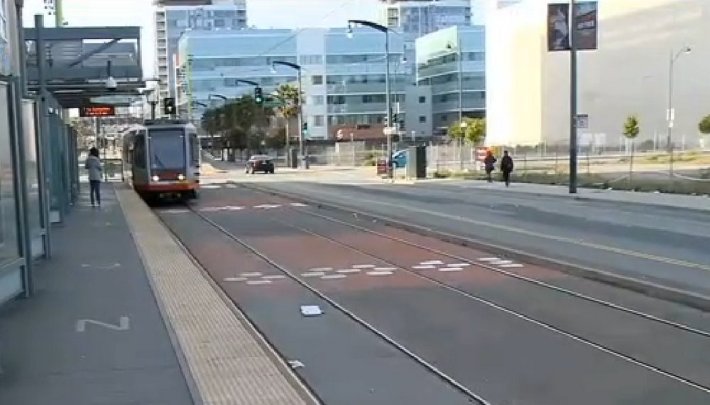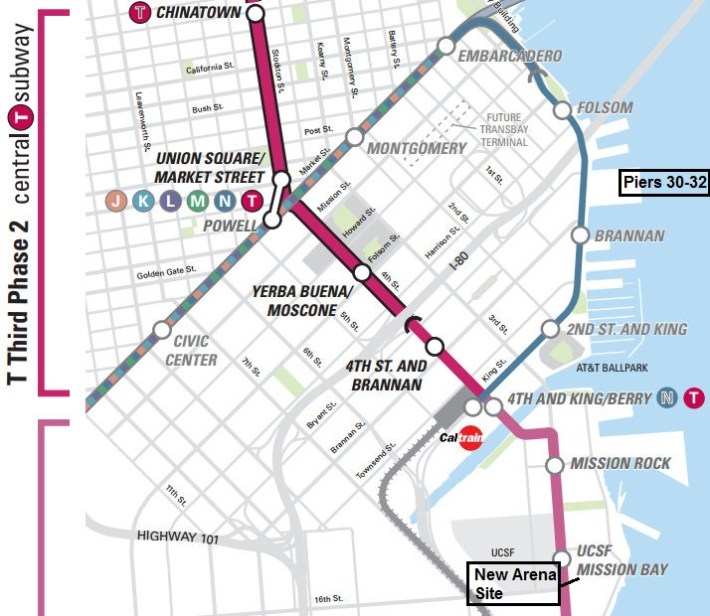
The Warriors announced this week that the site for the basketball team's proposed arena would be moved from Piers 30-32 on the Embarcadero to Mission Bay, quelling opposition from waterfront development foes. Whether or not the new site will work out for better or worse in terms of accessibility to regional transit, however, is still up for debate.
The Mission Bay site at 16th Street and Third Street is nearly two miles from the nearest BART Station, out of normal walking distance for most visitors. Instead, fans taking BART will be expected to transfer on Muni lines such as the T-Third on the Central Subway corridor, which will stop right out front, and possibly the 22-Fillmore, if extension plans for that line are constructed in time. The distance from BART may be a loss in the eyes of some transit advocates, but it does have its upsides, argues Tom Radulovich, executive director of Livable City and a BART Board member.
Ultimately, Radulovich thinks the Warriors are best off staying at the existing Oakland Coliseum, which is close to BART and the Amtrak Capitol Corridor, making it a more transit-accessible location than either of the proposed San Francisco sites. But the Mission Bay site does leave open more opportunities for nearby transit access than the Embarcadero piers, given all the transportation plans in the works for Mission Bay.
At the proposed Pier 30-32 site, the 0.7-mile walk from Embarcadero BART "was far enough from BART to dissuade many folks from walking," said Radulovich. He pointed out that once the Central Subway opens in 2019, riders reaching BART via rail would rely on the N-Judah (which Giants Ballpark visitors already cram on to) and the future E-Embarcadero historic streetcar line, as the T-Third will no longer run on the Embarcadero. "Historic streetcars are expensive to operate, low capacity, and have accessibility challenges," said Radulovich. Additionally, he said, "It would have added to the capacity problems at Embarcadero Station, which is currently the most crowded BART station."
Furthermore, arena parking would be especially problematic by the Embarcadero. "The auto traffic that would have been generated by the hundreds of planned arena parking spaces would crowd streets like The Embarcadero and Second," said Radulovich, "where we'd like to see the city reduce the roadway width to improve sidewalks and create protected cycle paths."

As Peter Albert, who manages waterfront planning for the SFMTA, pointed out to KPIX, riders connecting from BART to the Mission Bay site via Muni would be more dispersed on different transit lines than at the piers. As part of the Muni Transit Effectiveness Project, the SFMTA plans to extend the 22-Fillmore eastward along 16th, connecting the Mission Bay arena to 16th Street BART. That would take some of the ridership load off the Central Subway, which would connect to Powell Station, a hub which Radulovich noted is less crowded than Embarcadero Station.
The Mission Bay site would still be within walking distance of the 4th and King Caltrain Station, and Radulovich noted that Caltrain is also looking at moving its 22nd Street station to 16th in Mission Bay, even closer to the new arena. As we've reported, proposals to make Mission Bay more accessible by foot, bike, and transit -- including the 22-Fillmore extension and construction of high-speed rail -- largely hinge upon the proposed removal of the 280 freeway north of 16th.
It's unclear if the Mission Bay arena will come with new parking spaces. The Embarcadero plan included a new 500-space parking garage, but a press release from the Warriors notes that Mission Bay "already has ample parking" -- a total of 9,000 spaces. The SF Chronicle said the site "has two adjacent parking garages that can hold a combined 2,130 cars."
The Mission Bay site is also surrounded by streets on four sides, so pedestrian traffic would be more disperse than at Piers 30-32, which only front on the Embarcadero.




